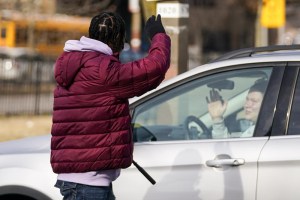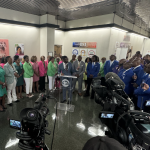By Tashi McQueen,
AFRO Political Writer,
tmcqueen@afro.com
On Jan. 10, part of Mayor Brandon Scott’s Squeegee Action Plan took effect.
The six-zone squeegee ban targets high-traffic intersections where panhandling and solicitation activity will no longer be tolerated.
The plan will be enforced by patrolling officers. To keep arrests low, squeegee workers will get two warnings before receiving a citation.
The zones include Wabash Avenue and Northern Parkway, Mount Royal and North Avenue, MLK and I-395, Conway st. and I-395, Sinclair and Moravia rd., Light and Conway streets, and President Street right before the start of the Jones Falls Expressway.
Drivers could also be punished if they stop traffic to give money to a squeegee worker illegally working in a “Disallowed Zone.”
Residents spoke with the AFRO the day the ban took effect, expressing their thoughts and concerns about the mayor’s plan.
Glenda Curtis, the equity officer of Baltimore’s Department of Housing and Community Development (DHCD), took issue with the physical locations of the six identified zones.
“It is my opinion that banned zones are in affluent and gentrified neighborhoods,” said Curtis. “If squeegeeing is banned in one zone, it should be banned everywhere. Baltimore City has an Equity Ordinance, which was the mayor’s legislation when he was on the council. For change to occur, it must be consistent and across the board.”
In a city that has been truly torn in half over the issue, Corey Moseley said he believes the squeegee issue is bigger than one elected official.
“I appreciate what Mayor Scott is doing, but this is bigger than him,” said Moseley, 45. “If you take away their main areas of funding, then they will crowd other corners, [using] possibly more dangerous methods of getting money.”
Moseley says that some children cannot afford to simply go to school because they are the only ones in their families working.
“Some of these kids don’t even have parents, they have to take care of their siblings, and they’re only 13 or 14,” said Moseley. “Squeegee kids will do what they have to make money, so they don’t starve.”
“Singular politicians often get blamed for these long-time issues, and you can’t do that,” said Moseley. “The only thing you can do is get closer to God.”
Jonathan Dean, a 29-year-old lawyer from Annapolis, Md., also spoke with the AFRO on Jan. 10.
“It’s not the right move to ban them from the high-traffic areas. It just moves the problem,” said Dean. “I’m supportive of the squeegee boys and don’t feel unsafe driving through the city. I’m always surprised when my friends are freaking out about them. Whenever the squeegee boys come to my car, I simply tell them no.”
Mark Anthony, 70, an accountant from Trinidad, saw the issue differently.
“We should get squeegee workers completely off the corners,” said Anthony. “I agree with Mayor Scott’s plan to help them get other jobs, but maybe we should bring back the draft since they want to use guns.”
Tashi McQueen is a Report For America Corps Member.
Help us Continue to tell OUR Story and join the AFRO family as a member –subscribers are now members! Join here!
The post Baltimoreans react to new squeegee ban zones appeared first on AFRO American Newspapers .











